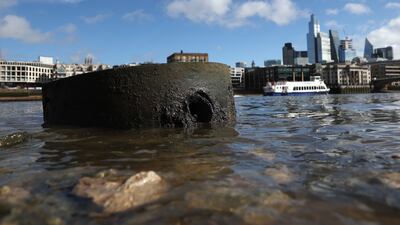It’s spring in England and (at last) it feels like it. There are bluebells in the woods along with wild garlic. The trees are bursting with buds. The bees are awake. I love this time of year partly because I enjoy swimming in the sea.
After avoiding the coldest months from December to February, in late March or early April I’m ready to take a dip again. The first cold swim is not much fun, but I’ve learnt a simple technique. I wait for high tide, pick a steep sloping shingle beach near the white cliffs on the Kent coast and dive in. The cold water is a shock, but I get out for a minute then jump back in, feeling the blood rush and eventually becoming acclimatised.
Repeating that drill for a couple of weeks, I can then swim in reasonable comfort until November. But maybe not any more. Despite the pleasure of swimming in sunshine on a Kent beach in sight of the French coast just 40km away, all is not well on what Shakespeare called “this sceptr’d isle” and “this precious stone set in a silver sea”.
The feeble joke now is that Shakespeare meant to write that England is “this septic isle”. The seas, lakes and rivers of Britain nowadays are often polluted with human sewage and animal waste. It is a national disgrace and a source of great anger for swimmers, anglers, sailors – in fact, just about all of us.
The problem started with the 1989 Water Act, privatising the water industry in England and Wales. This precious resource was sold off to private corporations for £7.6 billion ($9.6 billion). Each corporation is, in effect, a local monopoly. Oversight comes from the regulator, the Water Services Regulation Authority, usually called Ofwat.
Profits could be reinvested in modern pipes, sewers, fewer leaks and better services, but huge amounts have drained away as dividends to shareholders, including foreign corporations. Old sewage systems are overloaded, discharging into rivers and the sea. Leaks are not fixed fast enough. Ofwat reported that water companies in England and Wales lost an average of 2,923.8 million litres of water a day in 2021-22. That works out at a trillion litres of water leaks a year.
Sewage dumping means our beautiful lakes and beaches are often too disgusting for swimmers. Water sports can be dangerous to health. Rowers in last month’s Oxford and Cambridge University boat race were warned not to celebrate victory by jumping in the river Thames. The fear is of ingesting E-coli bacteria and becoming ill.
Although the rowers avoided jumping in, it was reported that even so, some crew members did indeed become sick after the race. Where I swim on the English south coast, the beaches for 10 miles in either direction remain clean and the waters clear. But further around the coast there are plenty of disappointed and often outraged bathers, sailors, rowers and surfers banding together to protest and to secure government action.
One protest group, Surfers Against Sewage, produces online warnings of dangerous pollution and a useful map of the dirty spots on the coast. Kent volunteers created SOS Whitstable, an organisation that targets the local water company and pollution of the seas from the Thames estuary as far as Sussex and Hampshire.
Water pollution, in other words, is now a British national and political scandal. Privatisation has produced more problems than it has solved – except for those who invested early and took hefty profits.
A former Conservative MP who voted in favour of privatisation back in 1989 told me recently that he now accepted that water privatisation was a failure. So what can be done? Well, the scandal has moved on from merely a matter of public disgust and a threat to the environment. It’s also become a threat to health and tourism, and an economic failure, too.
The largest private water company in Britain, Thames Water, is in financial trouble. It is reported to have incurred £18 billion in debt despite in the past generously rewarding shareholders.
Critics point out that much of that money could have been invested in the long-term health of pipes, sewage disposal and a better long-term financial situation. Thames Water nevertheless planned to increase charges to customers by 56 per cent by 2030 and demanded lower fines for environmental damage.
Under immense political and public pressure, the regulator Ofwat said no. Total debt from all water companies is now put at £60 billion, while historically £72 billion has been paid out to shareholders. The water scandal – political, financial, environmental and in terms of public health – is at crunch point.
The regulator, and ultimately the British government, may be forced to choose between the hugely unpopular idea of charging consumers even more for a poor and polluting service or the equally problematic possibility that water companies will go bust. Some of my fellow swimmers are so angry that it’s hardly surprising we jump in the sea to cool down. But in an election year we will also vote.


